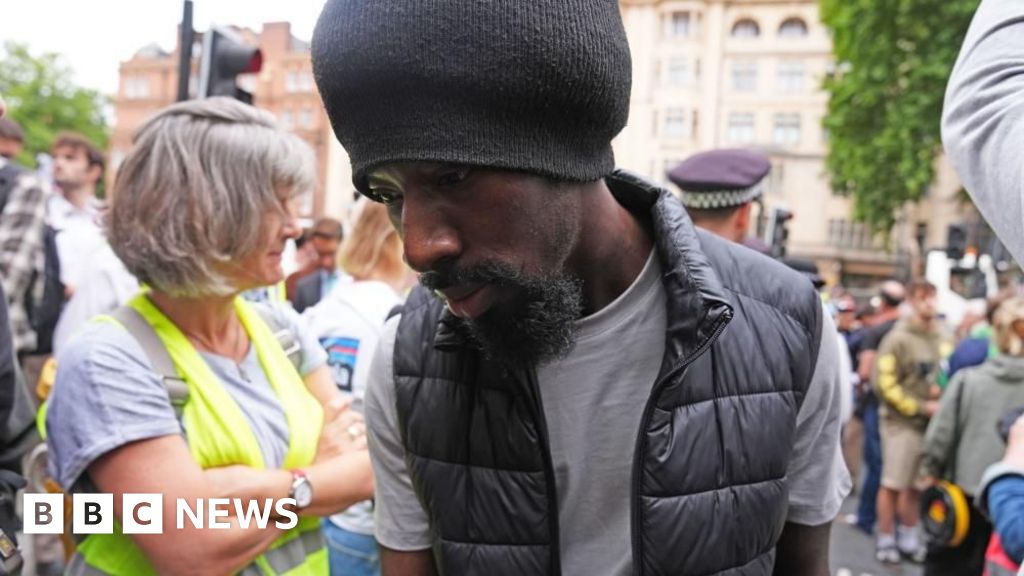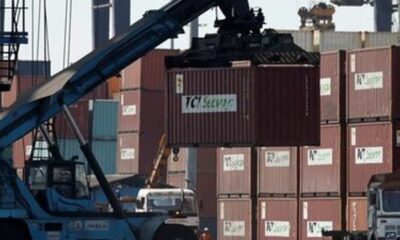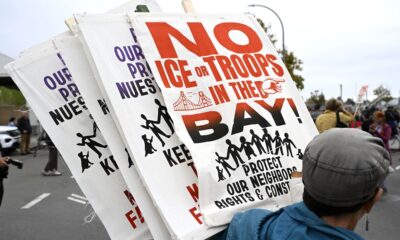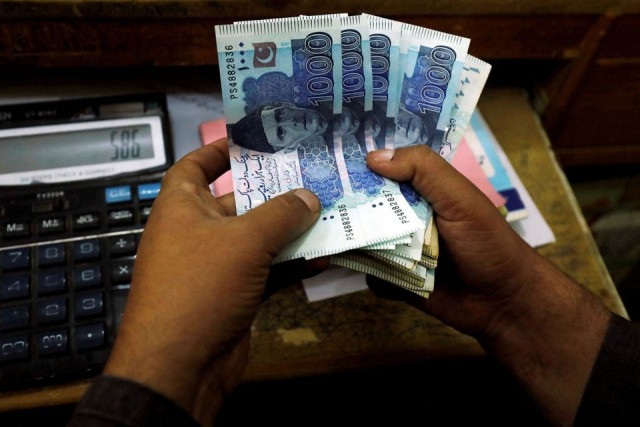Business
European carriers pause some shipments to U.S. as they prepare for end of ‘de minimis’ exemption

An aerial view of a cargo ship being loaded with shipping containers at the Port of Baltimore in Baltimore, Maryland, on August 7, 2025.
Jim Watson | Afp | Getty Images
Postal carriers across Europe are planning to suspend some shipments to the U.S. as the nations prepare for the end of a longstanding trade rule.
Certain shipments from Germany, Spain, France, Belgium, Sweden, Denmark, Finland, Norway and Switzerland are due to be paused in the coming days and weeks after President Donald Trump signed an executive order ending the century-old “de minimis” exemption.
The trade policy, sometimes referred to as a “loophole,” has allowed shipments valued under $800 to enter the U.S. virtually duty-free. The practice is set to end for imports from around the globe on Friday following Trump’s executive order.
The de minimis exemption for goods coming from China and Hong Kong, which have long accounted for the bulk of those shipments, ended in May.
The suspensions will impact shipments valued under $800, and largely exclude gifts and letters. Most of the countries said they have to pause shipments because their systems weren’t built for the new requirements and they’re unsure how to properly process the shipments under the new rules.
In a Friday statement, German-based international shipping company DHL said Deutsche Post and DHL Parcel Germany will no longer be able to accept and transport parcels destined for the U.S. It said “key questions remain unresolved, particularly regarding how and by whom customs duties will be collected in the future, what additional data will be required, and how the data transmission to the U.S. Customs and Border Protection will be carried out.”
Customers will still be able to ship goods via DHL Express, which is more expensive.
National post offices in Spain, France and Belgium issued similar notices.
In a news release, Spain’s national post office Correos said it learned of the detailed requirements necessary to comply with the executive order on Aug. 15 and hasn’t had enough time to change its systems.
“This situation forces Correos, along with all postal operators that manage shipments destined for the United States, to substantially modify their processes and increase shipment controls to implement the new customs requirements, significantly impacting international postal logistics and e-commerce flows,” Correos said, adding the suspension took effect on Monday.
It said it is working to resume the shipments “as quickly as possible.”
Belgium’s post office said it was suspending shipments beginning on Saturday while France’s La Poste said shipments would be suspended beginning on Monday.
Meanwhile, Finland’s post office Posti stopped accepting goods bound for the U.S. on Saturday but later added it could no longer accept gifts or letters either because “several airlines have now refused to transport any postal items to the United States.”
The carriers said they expect the suspensions to be temporary. The pauses could delay some shipments, but are not expected to affect most international commerce.
Larger retailers, both domestic and international, don’t tend to use the de minimis exemption that often because they ship their goods via containers to U.S. warehouses and pay tariffs on the goods. Two major exceptions are Temu and Shein, which popularized the use of de minimis and relied on it for the bulk of their shipments to U.S. consumers. Since de minimis ended for goods shipped from China, demand has fallen for Shein and Temu as prices have risen.
The suspended shipments are expected to impact smaller orders from Americans who are shopping from smaller European businesses directly.
Business
Govt keeps petrol, diesel prices unchanged for coming fortnight – SUCH TV

The government on Thursday kept petrol and high-speed diesel (HSD) prices unchanged at Rs253.17 per litre and Rs257.08 per litre respectively, for the coming fortnight, starting from January 16.
This decision was notified in a press release issued by the Petroleum Division.
Earlier, it was expected that the prices of all petroleum products would go down by up to Rs4.50 per litre (over 1pc each) today in view of variation in the international market.
Petrol is primarily used in private transport, small vehicles, rickshaws, and two-wheelers, and directly impacts the budgets of the middle and lower-middle classes.
Meanwhile, most of the transport sector runs on HSD. Its price is considered inflationary, as it is mostly used in heavy transport vehicles, trains, and agricultural engines such as trucks, buses, tractors, tube wells, and threshers, and particularly adds to the prices of vegetables and other eatables.
The government is currently charging about Rs100 per litre on petrol and about Rs97 per litre on diesel.
Business
Gold price today: How much 22K, 24K gold cost in Delhi, Patna & other cities – Check rates – The Times of India

Gold prices climbed to a fresh lifetime high in the domestic market on Thursday amid sustained buying by jewellers and stockists, according to the All India Sarafa Association.Gold advanced by Rs 800 to hit a new peak of Rs 1,47,300 per 10 grams (inclusive of all taxes), extending gains for the fifth consecutive session. The yellow metal had closed at Rs 1,46,500 per 10 grams in the previous session.Since the start of 2026, gold prices have surged Rs 9,600, or around 7 per cent, supported by persistent demand in the physical market. In overseas trade, spot gold slipped USD 12.22, or 0.26 per cent, to USD 4,614.45 per ounce, after having touched a record high of USD 4,643.06 per ounce in the previous session.Here is how much gold costs in major Indian cities today:
Gold price in Delhi today
The price of 22K gold in Delhi is Rs 13,140 per gram, down Rs 75, while 24K gold is priced at Rs 14,333 per gram, lower by Rs 82.
Gold price in Chennai today
In Chennai, 22K gold costs Rs 13,290 per gram, up Rs 10, while 24K gold is priced at Rs 14,498 per gram, higher by Rs 10.
Gold price in Mumbai today
Mumbai markets see 22K gold priced at Rs 13,125 per gram, down Rs 75, while 24K gold stands at Rs 14,318 per gram, lower by Rs 82.
Gold price in Ahmedabad today
In Ahmedabad, 22K gold is priced at Rs 13,130 per gram, down Rs 75, while 24K gold costs Rs 14,323 per gram, lower by Rs 82.
Gold price in Kolkata today
Kolkata markets price 22K gold at Rs 13,125 per gram, down Rs 75, while 24K gold stands at Rs 14,318 per gram, lower by Rs 82.
Gold price in Jaipur today
In Jaipur, 22K gold costs Rs 13,140 per gram, down Rs 75, while 24K gold is priced at Rs 14,333 per gram, lower by Rs 82.
Gold price in Hyderabad today
Hyderabad sees 22K gold at Rs 13,125 per gram, down Rs 75, while 24K gold is priced at Rs 14,318 per gram, lower by Rs 82.
Gold price in Bhubaneswar today
Bhubaneswar markets see 22K gold priced at Rs 13,125 per gram, down Rs 75, while 24K gold costs Rs 14,318 per gram, lower by Rs 82.
Gold price in Patna today
In Patna, 22K gold costs Rs 13,130 per gram, down Rs 75, while 24K gold is priced at Rs 14,323 per gram, lower by Rs 82.
Gold price in Lucknow today
Lucknow markets see 22K gold priced at Rs 13,140 per gram, down Rs 75, while 24K gold costs Rs 14,333 per gram, lower by Rs 82.
Business
Serial rail fare evader faces jail over 112 unpaid tickets

One of Britain’s most prolific rail fare dodgers could face jail after admitting dozens of travel offences.
Charles Brohiri, 29, pleaded guilty to travelling without buying a ticket a total of 112 times over a two-year period, Westminster Magistrates’ Court heard.
He could be ordered to pay more than £18,000 in unpaid fares and legal costs, the court was told.
He will be sentenced next month.
District Judge Nina Tempia warned Brohiri “could face a custodial sentence because of the number of offences he has committed”.
He pleaded guilty to 76 offences on Thursday.
It came after he was convicted in his absence of 36 charges at a previous hearing.
During Thursday’s hearing, Judge Tempia dismissed a bid by Brohiri’s lawyers to have the 36 convictions overturned.
They had argued the prosecutions were unlawful because they had not been brought by a qualified legal professional.
But Judge Tempia rejected the argument, saying there had been “no abuse of this court’s process”.
-

 Politics1 week ago
Politics1 week agoUK says provided assistance in US-led tanker seizure
-

 Entertainment1 week ago
Entertainment1 week agoDoes new US food pyramid put too much steak on your plate?
-

 Entertainment1 week ago
Entertainment1 week agoWhy did Nick Reiner’s lawyer Alan Jackson withdraw from case?
-

 Business1 week ago
Business1 week agoTrump moves to ban home purchases by institutional investors
-

 Sports5 days ago
Sports5 days agoClock is ticking for Frank at Spurs, with dwindling evidence he deserves extra time
-

 Sports1 week ago
Sports1 week agoPGA of America CEO steps down after one year to take care of mother and mother-in-law
-

 Business1 week ago
Business1 week agoBulls dominate as KSE-100 breaks past 186,000 mark – SUCH TV
-
Sports6 days ago
Commanders go young, promote David Blough to be offensive coordinator














